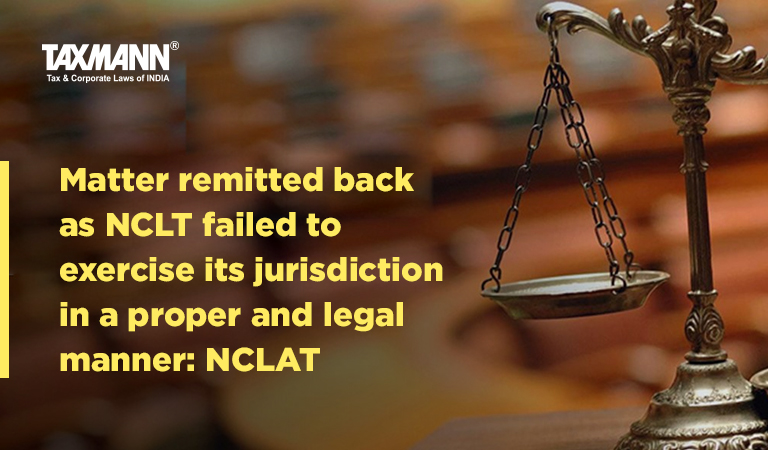Matter remitted back as NCLT failed to exercise its jurisdiction in a proper and legal manner: NCLAT
- Blog|News|Insolvency and Bankruptcy Code|
- 2 Min Read
- By Taxmann
- |
- Last Updated on 8 November, 2021

Case Details: Ravi Sankar Devarakonda v. Kesava Kolar - [2021] 131 taxmann.com 329 (NCLAT - Chennai)
Judiciary and Counsel Details
-
-
M. Venugopal, Judicial Member and Kanthi Narahari, Technical Member
- Abhishek Anand, Adv. for the Appellant.
-
Facts of the Case
The appellant was hired as a resolution specialist to handle the corporate debtor’s Corporate Insolvency Resolution Process (CIRP). On the other side, the respondent filed an appeal challenging the decision of admission that led to the initiation of the Corporate Insolvency Resolution Process (CIRP) against the corporate debtor. During the pendency of the appeal, the present Tribunal ordered the appellant to continue performing the responsibilities required by the Code.
However, the instant tribunal allowed the appeal by setting aside the order admitting CIRP of the corporate debtor and directed the NCLT to fix the fees of the appellant for the CIRP period wherein 7 meetings of CoC were convened. The NCLT directed the corporate debtor to pay Rs. 75000 per month along with valuation certificate and advertisement cost to the resolution professional.
The corporate debtor, on the other hand, failed to pay the aforesaid amount to the appellant despite various orders passed by the NCLT to remit the amount of CIRP expenses to the appellant. Consequently, the appellant filed an application seeking an order of contempt against the corporate debtor, and the same was denied by the NCLT holding that it was not known whether the contemnor/corporate debtor was financially solvent or not, in order to initiate contempt proceedings.
On instant appeal assailing the order passed by the NCLT in contempt application.
NCLAT Held
The NCLAT stated that the NCLT had requisite power to punish a contemnor and to adjudicate contempt petition on merits, NCLT by passing impugned order had not exercised its jurisdiction in a proper and legal manner. Therefore, the matter was to be remitted back to NCLT for passing the necessary order
Case Review
-
- Ravi Shankar Devarakonda v. Kesava Kolar [2021] 131 taxmann.com 328 (NCLT – Bengaluru) (para 31) set aside
List of Cases Referred to
-
- K. Kesava v. Ajay Gopaldas Samat (HUF.) [Co. Appeal (AT) (Ins) No. 36 of 2018, dated 27-2-2018] (para 7)
- K. Kesava v. Ajay Gopaldas Samat (HUF) [2018] 96 taxmann.com 266 (NCLAT – New Delhi) (para 8)
- Jhareswar Prasad Paul v. Tarak Nath Ganguly AIR 2002 SC 2215 (para 20)
- Alok Kaushik v. Bhuvaneshwari Ramanathan AIR 2015 SC 2216 (para 21)
- Ram Kishan v. Tarun Bajaj [2014] 16 SCC 204 (para 22)
- Manoj K. Daga v. ISGEC Heavy Engineering Ltd. [2020] 117 taxmann.com 249/161 SCL 437 (NCLAT – New Delhi) (para 23)
- Morpheus Developers (P.) Ltd. v. Sandeep Kumar Bhatt (R.P.) [Co. Appeal (AT) (Insolvency) No. 1155 of 2019, dated 11-11-2019] (para 24)
- Prem Surana v. Additional Munsif & Judicial Magistrate AIR 2002 SC 2956 (para 26).
Disclaimer: The content/information published on the website is only for general information of the user and shall not be construed as legal advice. While the Taxmann has exercised reasonable efforts to ensure the veracity of information/content published, Taxmann shall be under no liability in any manner whatsoever for incorrect information, if any.

Taxmann Publications has a dedicated in-house Research & Editorial Team. This team consists of a team of Chartered Accountants, Company Secretaries, and Lawyers. This team works under the guidance and supervision of editor-in-chief Mr Rakesh Bhargava.
The Research and Editorial Team is responsible for developing reliable and accurate content for the readers. The team follows the six-sigma approach to achieve the benchmark of zero error in its publications and research platforms. The team ensures that the following publication guidelines are thoroughly followed while developing the content:
- The statutory material is obtained only from the authorized and reliable sources
- All the latest developments in the judicial and legislative fields are covered
- Prepare the analytical write-ups on current, controversial, and important issues to help the readers to understand the concept and its implications
- Every content published by Taxmann is complete, accurate and lucid
- All evidence-based statements are supported with proper reference to Section, Circular No., Notification No. or citations
- The golden rules of grammar, style and consistency are thoroughly followed
- Font and size that’s easy to read and remain consistent across all imprint and digital publications are applied



 CA | CS | CMA
CA | CS | CMA
